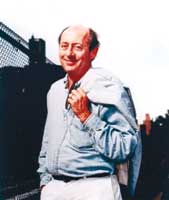|

Poet
Laureate Billy Collins: Lehman College
By
Ari McKenna
Billy
Collins was recently elected the Library of Congress’s eleventh
Poet Laureate Consultant in Poetry. “Billy Collins’ poetry is
widely accessible. He writes in an original way about all manners
of ordinary things and situations with both humor and a surprising
contemplative twist,” says James Billington, the Librarian of
Congress.
Collins accessibility has made him a popular and successful poet,
rarely described in his profession as “making money on the job”.
Collins has published six books of poetry in a relatively short
career and has also put out a number of compact discs.
He has received The National Endowment from the Arts and the Guggenheim
Fellowships, and in 1992 was named the New York Public Library
“Literary Lion.” He presently teaches at Lehman College.
We recently caught up with the busy Professor Collins for an email
interview.
How
do you feel about your recent appointment as the Poet Laureate
of the United States?
“Be
careful what you wish for” is an adage so familiar, there is no
need to finish it, but the laureateship is something I never even
fantasized about, and I have a rich fantasy life. So it came as
a complete surprise. I am still not used to it, but I am excited
about the opportunities it offers.”
What
are some of your priorities as Laureate?
“Every
Laureate seems to reinvent the job. Right now, I have one initiative,
which I am putting all my efforts into. The project is called
POETRY 180, a poem a day for American high schools. The 180 stands
for the roughly 180 days of the school year and, of course, it
implies a turning around. I am in the process of selecting 180
poems that should appear on the Library of Congress web site <www.loc.gov>
by January 1. I am encouraging high schools to have one poem read
each day to the whole school as part of the daily public announcements.
I am also discouraging teachers from discussing or analyzing the
poems in class. I just want students across the country to hear
a poem every day so that they will think of poetry as a feature
of daily life in addition to being a subject matter to be studied.”
Who
are your favorite poets from the past as well as among your contemporaries?
“There
is no such thing as a completely original poem because every poem
is a version of a number of past poems. I have probably been influenced
by everything I have read, for better or worse. Not to mention
everything I have seen. I would consider Warner Brothers cartoons
a serious influence on my imagination. Not to mention Mother Goose
and Jack Kerouac. Probably my most direct literary influence is
Coleridge; at least I have tried to model some of my longer meditative
poems on his so-called conversation poems. The one poem I would
take with me into isolation would be his “This Lime-Tree Bower
My Prison,” a beautifully improvised meditation on friendship
and nature.”
What
classes have you most enjoyed teaching at Lehman College?
“I
teach literature classes and creative writing classes. And I have
taught basic composition for 30 years largely because almost every
English teacher in the City University teaches it. I think it’s
possible to teach someone to read poetry better, but much less
possible to teach them to write better poetry. A number of vital
abilities are completely impossible to teach: namely, rhythm and
metaphor.”
What
is your favorite part of writing poetry?
“The
most exciting part of writing a poem is discovering its destination,
actually arriving at it. I am like most poets who are ignorant
of the poem’s ending. The poem, from the poet’s point of view,
might be seen as simply a means of getting to its end. In that
sense, the poem is a vehicle which runs along the tracks of the
language that the poet lays down, line by line. That is probably
the reason why the poem, once finished, holds absolutely no interest
for me. When you arrive at your destination, you lose interest
in the bus that brought you there.”
What
was your gauge on your poetry before being appointed Laureate?
How has it changed?
“The
only way the laureateship has affected my poetry is that it leaves
me much less time to write it. It also fills with activities those
spaces of free time which are conducive to thinking poetry thoughts,
those slow, grass-growing times. Instead, I have to spend a lot
of my time, not doing poetry, but doing poetry-related things.
Like answering interview questions!”
Ari
McKenna is an editorial intern from the New School.
Education Update, Inc., P.O. Box 20005, New York, NY 10001. Tel:
(212) 481-5519. Fax: (212) 481-3919. Email: ednews1@aol.com.
All material is copyrighted and may not be printed without express consent of
the publisher. © 2001.
|

